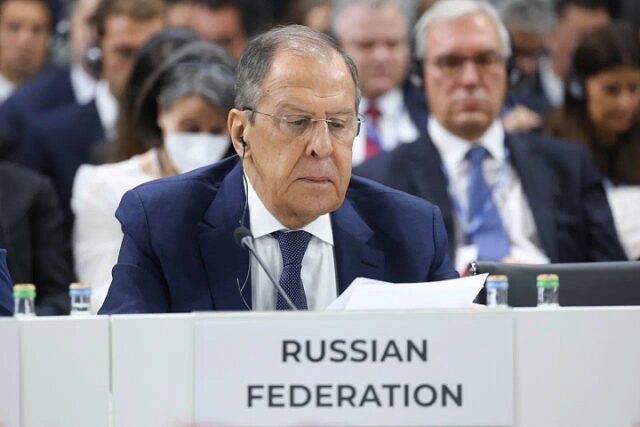
Russia Playing Cat-and-Mouse With OSCE (Part Two)
Publication: Eurasia Daily Monitor Volume: 20 Issue: 183
By:

Russia forced what it calls “the collective West” into significant concessions for this year’s Organization for Security and Co-operation in Europe (OSCE) annual meeting of foreign ministers. Using its statutory veto and blocking powers, Moscow forced the organization to replace Estonia with Malta to chair the OSCE in 2024 (see Part One). The Kremlin also compelled the OSCE to invite Foreign Minister Sergei Lavrov to this annual ministerial meeting as a precondition to alleviating other Russian strangleholds on the organization.
Moscow blocked the approval of the OSCE’s annual budgets in 2022 and 2023. The proposed budget amounted to some 138 million euros (about $150 million) per year, which had remained unchanged for the past ten years and therefore devalued through inflation. Without an approved budget, the OSCE can only function in a limited mode, receiving month-to-month allotments based on the last agreed-upon budget of 2021. The OSCE has had no authority to initiate new projects or activities during this time. Participating states have made extra-budgetary contributions for specific projects or activities, mostly humanitarian. Those, however, do not count as OSCE undertakings because Russia has not approved them in the organization’s decision-making Permanent Council (Security and Human Rights Monitor, July 4).
Russia has also blocked the appointment of the organization’s top four officials: the secretary-general, high commissioner on national minorities, representative on freedom of the media, and director of the OSCE Office for Democratic Institutions and Human Rights (specialized in observing and evaluating elections). Three out of these four officials are diplomats from Western Europe. All four were appointed in December 2020 for an initial term of three years that is traditionally rolled over into a second, final term of three years, in this case from December 2023 onward. Moscow, however, made clear in early 2023 that it would oppose these reappointments, in which case the OSCE found itself paralyzed on these fronts as well. Moscow apparently intends to negotiate a package deal over these appointments at this ministerial meeting with Lavrov’s participation (Security and Human Rights Monitor, November 27).
Institutionally, the OSCE is a collateral victim of Russia’s military and political operations in Georgia, Azerbaijan, Moldova, and more recently Ukraine. Over the years, Russia has used the OSCE to help consolidate Russian gains on the ground (i.e., “new realities” or “new status quo”). That done, Moscow discarded the OSCE in most conflict theaters, forcing the organization to close its field missions and abandon its mediator role. Similar to many international organizations, the OSCE prioritizes the goal of institutional perpetuation. Losing funding, abandoning field missions, and conflict-mediating functions under Russian duress has nullified the OSCE’s most cherished ambition—that is, being seen as a pivotal actor in European security.
Heading into this year’s meeting, the OSCE holds on to its last remaining mission in a “frozen conflict” theater in Moldova. The upcoming year-end meetings inspires a look back at how Russia has deprived the OSCE of its showcase field missions and negotiating platforms.
- In 2004, Russia vetoed the prolongation of the OSCE’s Georgia Border Monitoring Mission because the latter had not substantiated Moscow’s claims that Georgia was harboring terrorists (see EDM, January 4, April 19, 2005).
- In 2008, Moscow forced the OSCE to close its mission in South Ossetia, as well as forfeit its conflict-mediation services there, when Russia invaded and turned that part of Georgia into an “independent state” (see EDM, December 11, 19, 2008).
- In 2019–2020, the Kremlin simply circumvented the “Minsk Group” (nominally an OSCE-mandated platform) that had long tried to mediate a solution to the Karabakh conflict. Russia (itself a co-chair of that group) instead worked directly with Armenia and Azerbaijan in brokering the outcome of the Second Karabakh War in November 2020 and consigning the Minsk Group’s platform to oblivion (see EDM, November 25, December 1, 3, 7, 2020).
- In September 2021, Moscow vetoed the prolongation of the OSCE Observer Mission on the Russian-Ukrainian border, thus clearing the way to invade Ukraine five months later across that border (see EDM, September 30, 2021).
- In February 2022, on the eve of the invasion, Russia liquidated another OSCE platform: the “Trilateral Contact Group on Ukraine.” The OSCE had used this group to mediate between the Ukrainian government and Russia’s so-called “Donetsk and Luhansk People’s Republics.” Moscow terminated that platform by recognizing those “people’s republics” as “independent states” (see EDM, February 22, 24, 25, 2022)—the same maneuver used in South Ossetia.
- On February 24, 2022, Russia’s full-scale invasion of Ukraine physically forced the OSCE’s Special Monitoring Mission (SSM) to evacuate Ukraine immediately. In March 2022, Russia vetoed proposals to negotiate an OSCE mandate for the SMM, which would have theoretically allowed for its subsequent return to Ukraine (see EDM, March 17, 2022).
- Moscow has also “withheld consensus” (OSCE euphemism for veto) to the purely humanitarian OSCE Support Program for Ukraine. It, therefore, does not have the status of an OSCE program. The program is funded with 29 million euros (about $32 million) for a three-year period (2022–2025) from extra-budgetary contributions by willing countries.
The OSCE Mission in Moldova—scene of the Transnistria conflict—represents the OSCE’s last remaining claim to relevance in terms of conflict-management and mediation. The mission is wedded to the Russian-constructed, decades-old framework for conflict resolution (see EDM, January 26, 30, 31), but Moscow is watching. It has occasionally hinted at tinkering with the mission’s funding from the Vienna headquarters and only consents to prolonging the mission’s mandate at six-month intervals, instead of annually. Russia has no reason to block the mandate during this year’s ministerial meeting on November 30 and December 1.
The meeting’s outcome has, in part, been shaped in Russia’s favor by the preliminary maneuvering (see Part One). However, the final day, including the plenary session and private interactions during it, will reveal the true extent of Russian influence and the net balance sheet of the year for the OSCE.



